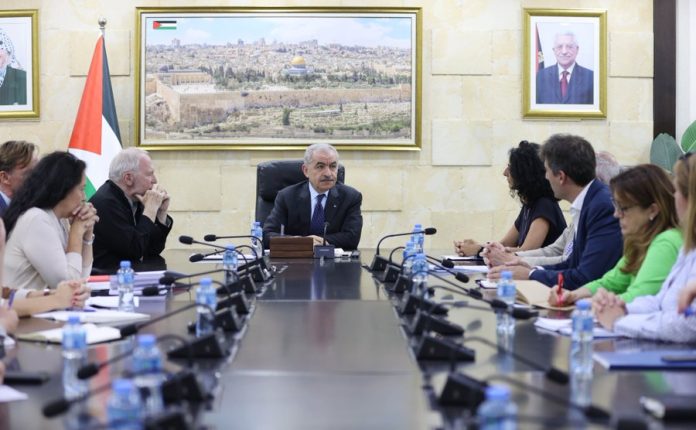A delegation of the Subcommittee on Human Rights of the European Parliament led by Vice-Chair Bernard Guetta conducted an official visit to Israel and Palestine on 18-22 June 2023.
The visit was the first of its kind by its human rights agenda and its geographic scope since 2015.
The Subcommittee’s visit took place within the framework of the bilateral relationships of the EU with Israel and Palestine and the EU’s longstanding commitment to a two-state solution.
In this spirit, and against the background of the protracted occupation of the Palestinian territories and the ongoing political deadlock of the peace process, combined with an escalation of violence that occurred during the visit, the delegation met with a broad range of Palestinian and Israeli officials, civil society representatives and other stakeholders to discuss the overall political and human rights situation.
More specifically, Members of the delegation met with high-level Palestinian officials, including Prime Minister Mohammad Shtayyed, Interior Minister Ziad Hab al-Reeh and Deputy Foreign Minister Amal Jadou, to discuss the challenges the Palestinian Authority faces politically, including the urgent need for holding elections as part of efforts to enhance democratic governance, the fight against corruption, increased shrinking space for civil society and the impact of the occupation on the Palestinian population and on prospects for the future.
Meetings were also organised with a series of Palestinian human rights organisations and Christian communities’ representatives and organisations to address the state of rights and freedoms of Palestinians and explore further ways and means of enhancing EU support to civil society. As part of this endeavour, the delegation visited a village located in Area C northwest of Ramallah under the auspices of OCHA, the Tent of Nations located near Bethlehem and the city of Hebron to have a first-hand view of the dire living and working conditions of Palestinians affected by settlements, growing settler violence and discriminatory legislation and infrastructure. The current challenges faced by Palestinian refugees were also thoroughly discussed in the presence of UNRWA. In addition, Members conducted a field-visit to the Ofer Juvenile Military Court where they talked with families of detainees and partly attended the trial of a detainee.
On the Israeli side, the delegation held extensive discussions with a number of Knesset Members representing the governmental coalition and the opposition. Topics discussed included the current political developments in the country, the entry of the far-right wing into the governmental coalition and its annexation agenda and the prospect of a two-state solution.
Several meetings were also organised with Israeli legal experts, academics, NGOs and journalists on the announced reforms of the judiciary and legal system, the judicial reform protests from early 2023, the draft law taxing support to human rights and humanitarian organisations, draft laws amending provisions related to equality and women’s rights, as well as legislation which excludes and discriminates against the Palestinian Arab minority.
Members had a meeting with the family of Hadar Goldin, a soldier killed in Gaza, whose case was included in several European Parliament resolutions and for whom there still are humanitarian calls for the repatriation of his remains. Members conducted a field-visit to Sderot where they met with representatives of the Trauma Coalition, an organisation, which helps residents, in particular children, to cope with, among other things, rocket trauma. The organisation mentioned the tunnels built by Hamas leading into Israel. Despite the requests to meet with Israeli authorities, the delegation did not have the opportunity to exchange with them and the delegation was not allowed to access to Gaza.
Finally, Members discussed the outcome of their visit with Heads of EU Member States’ Missions in Jerusalem and Tel Aviv at the invitation of the EU Representative of the Office to the West Bank, Gaza Strip and UNRWA and the EU Head of Delegation to Israel.
This mission leads Members of the delegation to insist on these urgent necessities:
-
- A stop of the cycle of violence and continued efforts when it comes to working towards the two state solution,
-
- To address the attacks on the very foundations of democracy, as well as the governing weakness of the Palestinian Authority, which, if not reversed, could further limit peaceful and democratic prospects for Israelis and Palestinians,
-
- To develop a coherent, integrated and visionary strategy from the EU side that takes into account bilateral commitments and the consequences of the non-observance of those commitments. The EU as an actor committed to the respect for the human rights of all peoples should actively propose responses, including full use of its human rights sanctions regime in relation to actions, which violate international law and exacerbate violence regarding illegal settlements,
-
- To address discrimination preventing Palestinians from enjoying their fundamental rights and to promote equality in order to restore dignity,
-
- To discuss the establishment of a refunding compensation system of destroyed or confiscated EU financial projects,
-
- To support the crucial role that education plays in promoting peace in both places,
-
- To substantially increase EU political and financial support to all those in Israel and Palestine who promote accountability, peace and equality, including human rights NGOs and actors promoting peaceful and educational projects such as the Tent of Nations as a way of building the necessary trust to re-open a political horizon.
In addition to Chair Mr Guetta (Renew Europe, France), the delegation consisted of the following MEPs: Isabel Wiseler-Lima (EPP, Luxembourg), Peter Van Dalen (EPP, Netherlands), Maria Arena (S&D, Belgium), María Soraya Rodríguez Ramos (Renew Europe, Spain) and Jordi Solé (The Greens/EFA, Spain).

